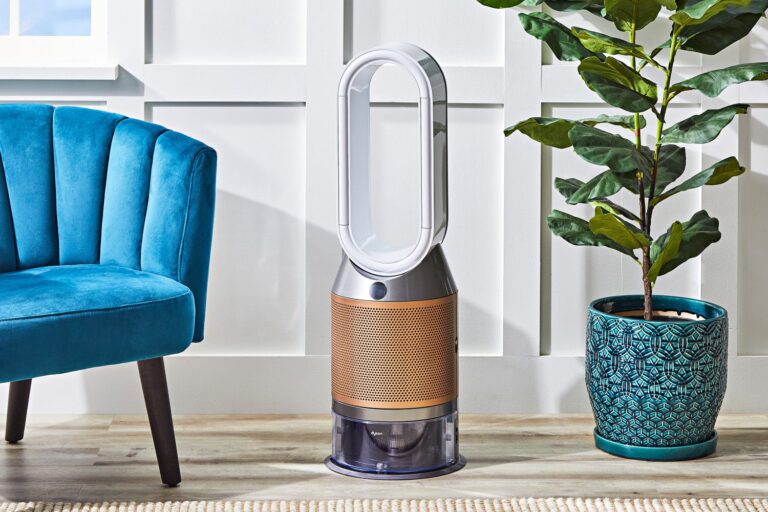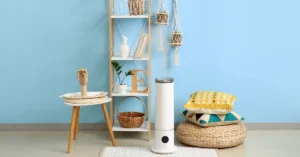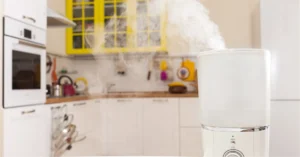Yes, an air purifier can effectively help with dust by filtering out airborne particles and improving indoor air quality. Dust is a common problem in many homes and can cause allergies, respiratory issues, and a general feeling of discomfort.
An air purifier works by drawing in air and trapping dust particles within a filter, ensuring cleaner and fresher air. It is particularly beneficial for people with allergies or asthma, as it reduces the presence of dust mites, pollen, pet dander, and other allergens.
With its ability to remove dust particles and improve indoor air quality, an air purifier is a valuable investment for a healthier and more comfortable living environment.

Credit: www.amazon.com
The Basics Of Air Purifiers
An air purifier is a helpful device that can aid in reducing dust and improving air quality in the home. These devices work by removing pollutants, such as dust particles, allergens, and odors, from the air. There are several different types of air purifiers available, each with its unique way of functioning. Understanding how they work can help you determine the best option for your needs.
One common type of air purifier is a mechanical filter purifier. This type uses a filter, often made of HEPA (High-Efficiency Particulate Air), to trap and capture particles as air passes through it. This can include dust, pet dander, pollen, and other airborne irritants. Another type is the activated carbon purifier, which uses a filter coated with activated carbon to absorb odors and chemicals.
When choosing an air purifier, there are key features to consider. Look for a purifier with a high CADR (Clean Air Delivery Rate), which indicates its effectiveness in filtering the air. Additionally, consider the size of the purifier in relation to the room you plan to use it in, as well as the noise level and energy efficiency.
An air purifier can be a valuable addition to any home, especially for those with dust allergies or respiratory issues. By understanding how they work and the important features to consider, you can make an informed decision and improve the air quality in your living space.
Can An Air Purifier Help With Dust?
HTML Response
An air purifier is a valuable tool for improving indoor air quality, especially when it comes to tackling dust. Dust particles can negatively impact the air we breathe, leading to respiratory issues and allergies.
How do air purifiers address this problem? They work by capturing and removing the smallest particles of dust from the air. High-efficiency particulate air (HEPA) filters, commonly used in air purifiers, are capable of trapping fine particulate matter including dust. These filters are designed to capture particles as small as 0.3 microns with a 99.97% efficiency rate.
When an air purifier is properly maintained and the filters are regularly cleaned or replaced, it can be highly effective in reducing dust levels in your indoor environment. However, it’s important to note that air purifiers are not a complete solution. Regular cleaning and dusting of surfaces is still necessary to minimize dust accumulation.
| Pros of Using an Air Purifier for Dust: | Cons of Using an Air Purifier for Dust: |
|---|---|
|
|
Health Benefits Of Clean Air
Can an Air Purifier Help With Dust
Respiratory Health And Breathing Easier
Maintaining clean air is crucial for our respiratory health. Air purifiers are designed to filter out dust, pollen, and other airborne particles, effectively reducing the risk of respiratory issues. By capturing and trapping these harmful particles, air purifiers help prevent them from entering our lungs, promoting easier breathing and reducing the incidence of asthma attacks and allergies. Whether you suffer from chronic respiratory conditions or simply want to improve your breathing, an air purifier can make a significant difference.
Allergy Relief And Reduction Of Allergens
Allergens such as pet dander, mold spores, and dust mites can trigger allergic reactions in sensitive individuals. An air purifier can eliminate these allergens from the air we breathe, creating a cleaner and healthier environment. By removing these irritants, air purifiers reduce the symptoms of allergies, such as sneezing, coughing, and itchy eyes. The reduction of allergens in the air also helps individuals with respiratory conditions who are prone to allergic reactions, improving their overall quality of life.
Eliminating Harmful Particles For Better Overall Health
Air purifiers are not only effective in removing dust and allergens but also in eliminating other harmful particles such as bacteria, viruses, and volatile organic compounds (VOCs). These pollutants can have detrimental effects on our health, contributing to respiratory infections, illnesses, and general discomfort. With an air purifier, you can improve your overall health by ensuring the air you breathe is cleaner and free from potentially harmful substances.
Choosing The Right Air Purifier
When selecting an air purifier for your home, there are several factors to consider. The first important factor is the room size and coverage area. Determine the square footage of the room where you will be using the air purifier, and choose one that is suitable for that size. A larger room will require a purifier with a higher coverage area.
The next factor to consider is the noise level. Look for an air purifier that operates quietly, especially if you plan to use it in your bedroom or office. Noise can be distracting and disrupt your sleep or concentration. Additionally, it’s important to consider the energy efficiency of the purifier. Look for a model that is energy efficient, as it will save you money on your electricity bill and also reduce your carbon footprint.
| Factors to Consider | Examples |
|---|---|
| Room Size and Coverage Area | Small room: 100-200 sq. ft. Medium room: 200-400 sq. ft. Large room: 400+ sq. ft. |
| Noise Level | Low noise level: < 50 decibels Quiet operation for bedrooms and offices |
| Energy Efficiency | Energy Star certified Low power consumption |
By taking these factors into consideration, you can choose an air purifier that is the right fit for your needs and effectively helps to reduce dust and improve the air quality in your home.
Additional Features And Considerations
Filter Replacement and Maintenance: When choosing an air purifier, it is essential to consider the ease of filter replacement and maintenance. Look for models that have easily accessible filters and clear instructions on when and how to replace them.
Air Purifier Placement for Optimal Performance: To maximize the effectiveness of your air purifier, it is important to place it in the right location. Proper placement ensures that the air purifier can effectively clean the air in the room. Consider placing it in a central area or near the source of dust or pollutants.
Smart Air Purifiers and Advanced Technology: Smart air purifiers offer advanced features and benefits. These devices can be controlled remotely through smartphone apps, adjust settings automatically based on air quality, and provide real-time air quality monitoring. Consider investing in a smart air purifier for added convenience and efficiency.
Frequently Asked Questions For Can An Air Purifier Help With Dust
Do Air Purifiers Really Reduce Dust?
Yes, air purifiers are effective in reducing dust. They filter out airborne particles, including dust, to improve indoor air quality.
What Is The Best Air Purifier For Dust Removal?
The best air purifier for dust removal is the one with a high-efficiency particulate air (HEPA) filter. HEPA filters can capture tiny particles like dust and allergens. Look for air purifiers with a True HEPA filter to ensure effective dust removal.
How Long Does It Take For An Air Purifier To Remove Dust?
An air purifier can remove dust within a few hours of continuous operation. It filters the air and traps dust particles, improving the air quality in your space.
How Do I Stop My House From Being Dusty?
To reduce dust in your house: 1. Clean and vacuum regularly. 2. Use doormats to trap dust from shoes. 3. Invest in air purifiers and filters. 4. Minimize clutter to prevent dust accumulation. 5. Keep windows closed and use dust-proof covers for furniture.
Conclusion
To sum up, an air purifier can indeed help alleviate the problem of dust in your home. With its advanced filtration system, it efficiently traps and removes airborne particles, providing you with cleaner and healthier indoor air. By reducing dust, an air purifier can also minimize allergies and respiratory issues.
So, consider investing in one to breathe easier and enjoy a dust-free environment.




